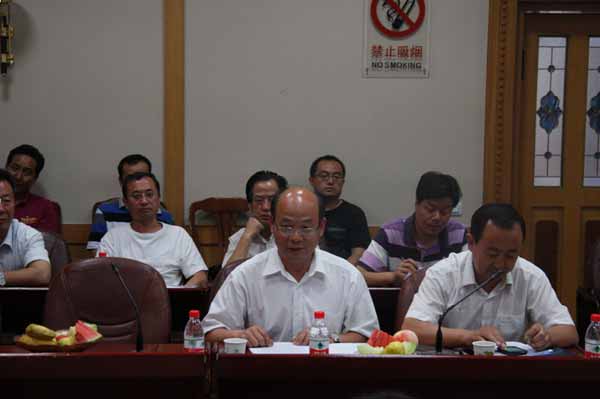 Russian navy ships make peace visit to Cuba
Russian navy ships make peace visit to Cuba
 Shanghai Tower topped off with final beam
Shanghai Tower topped off with final beam
 Children model contest held in N China
Children model contest held in N China
 Death toll rises to 29 in rain-related accidents across Pakistan
Death toll rises to 29 in rain-related accidents across Pakistan
 Gales brought by tropical storm Jebi hit coastal areas of Guangxi
Gales brought by tropical storm Jebi hit coastal areas of Guangxi
 Nutrica recalls Karicare infant formula in New Zealand
Nutrica recalls Karicare infant formula in New Zealand
 Li Na attends official draw ceremony for women's singles of Rogers Cup
Li Na attends official draw ceremony for women's singles of Rogers Cup
 Child labor still remains rampant in war-hit Afghanistan
Child labor still remains rampant in war-hit Afghanistan
 3rd Tangka Art Exposition opens in Lhasa
3rd Tangka Art Exposition opens in Lhasa
 |
| Zhao De'an, president of Northwest University for Nationalities, speaks at a media session at the university in Lanzhou, Gansu province, August 2. (chinadaily.com.cn) |
Northwest University for Nationalities (NWUN) has long been overlooked as a mediocre school recruiting minority students in remote northwestern Gansu province. But the university has actually been making great contributions on many frontiers for decades.
"Based on boosting the regional economy (by producing talented students hailing from ethnic minorities), NWUN has a national vision, which is that the prosperity of ethnic groups can play a role in deciding a country's world status," said Zhao De'an, NWUN's president.
Zhao made the remark at a media session on Friday in hopes of promoting the multi-disciplinary university's efforts in education and research of minority groups.
Originating from a small institution in Lanzhou city that only enrolled about 120 students from nine ethnic groups dating back to 1960, the university now accommodates more than 25,000 from all China's 56 nationalities majoring in 67 subjects, said Zhao, adding that the university has cultivated approximately 130,000 talented professionals in a variety of fields for the country.
Tens of thousands of students from every corner of the country studying and living under the same roof also means they will learn to be tolerant and respectful of different habits, which will ultimately propel national harmony, he said.
Just do it
Among NWUN's 1,800 faculty members and scholars, Professor Yu Hongzhi is the most decorated. She is known for her more than 30 years of devotion to research of information technology for minority groups.
Yu, 66, heads the China Minorities Information Technology Institute at the university. She and her team have spent the last three decades developing ethnic-language information systems and software, including the earliest DOS and Windows operating systems for minority groups.
"That was an extremely difficult project because of the special formation of the characters of Chinese ethnic groups," she said.
But the team has completed the impossible mission, infiltrating into more linguistic information platforms such as remote education, modern speech synthesis systems, digital libraries and the newest Android system in Tibetan.
Yu became a two-time National Prize for Progress in Science & Technology winner for the projects of the Tibetan-Chinese Bilingual Information Processing System in 1999 and the Tibetan Window Flat Word Processing Software & Tibetan Website in 2001.
 |
 Tough training of PLA special forces
Tough training of PLA special forces  Muslims pray during religious ceremony of Ramadan in Iran
Muslims pray during religious ceremony of Ramadan in Iran Confession of a parkour lover
Confession of a parkour lover CoCo Lee promotes new album 'Illuminate' in Taipei
CoCo Lee promotes new album 'Illuminate' in Taipei Two gold-backed ETFs launched in Shanghai
Two gold-backed ETFs launched in Shanghai Qinghai Lake hot tourist destination in summer
Qinghai Lake hot tourist destination in summerDay|Week|Month